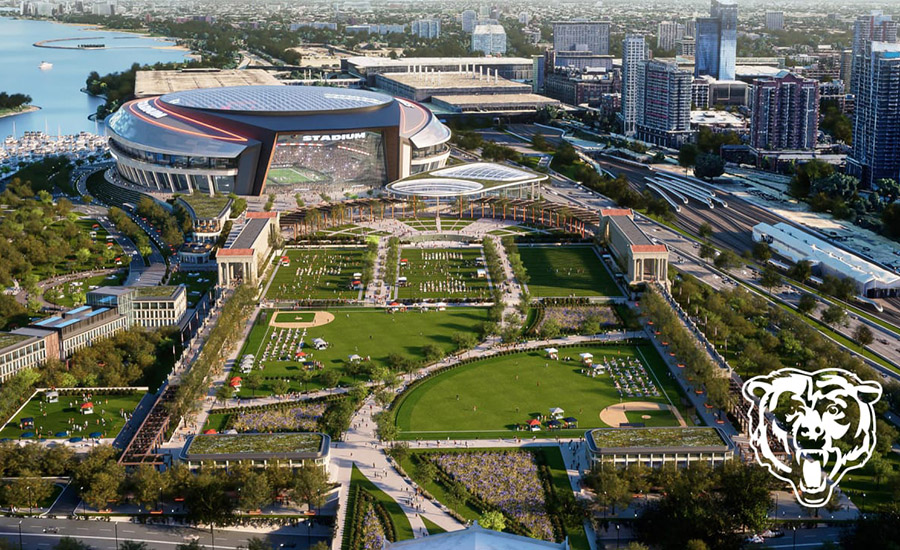Chicago Bears Push Plans Forward for $4.6B Lakefront Stadium | Columbus Ohio Dump Trucks
Sports

National football franchise wants to build $4.6 million domed stadium on the Chicago lakefront.
Photo courtesy of the Chicago Bears
The Chicago Bears debuted plans April 24 to build a $4.6-billion domed stadium on property in the city’s Museum Campus overlooking Lake Michigan. Insisting it no longer plans to build a stadium in the suburbs, the team said it would demolish its current nearly 100-year-old home, Soldier Field, and replace it with gardens and athletic fields.
Only Soldier Field’s colonnades would be preserved under the plan that also calls for creating a 14-acre campus with panoramic views of the lake and cityscape that would include athletic fields, parks, a promenade and a plaza where food and beverages would be sold.
The 77,000-seat stadium would not have a retractable roof—which team President Kevin Warren said would have added $2 million to the cost and would likely be used infrequently. Instead it would be covered by a translucent roof.
“You’ll be indoors, but you’ll have all the benefits of being outdoors. It will feel like you are outdoors,” he said.
The team worked with Kansas City-based architectural firm Manica to create plans for the proposed stadium that would be owned by the Chicago Park District.
It also would have a north wall made of glass to highlight the city's Michigan Avenue skyline.
The team wants to fund the stadium with $2.3 billion of private funding, including a $300 million loan from the National Football League—and $2.3 billion in public funding that would need approval by the Illinois Sports Facilities Authority, a government entity created in 1987 for constructing and renovating professional sports stadiums in Illinois.
“We are asking the [authority] to do what they were put in place to do,” Warren said.
The team envisions the new stadium as a place where the city could host world-class events including the Super Bowl, Olympics or college level basketball finals. It would also welcome school teams to play and host events such as concerts or graduation ceremonies.
Karen Murphy, executive vice president of stadium development for the Bears, said the overall project would be constructed in phases.
The first phase would include $325 million for roadway and utility improvements, which she said are crucial to a new stadium.
“We need the $325 million [for infrastructure improvements] to open the stadium,” said Murphy, explaining that the team would seek city, state and federal funds to pay for these improvements.
The second phase of the campus would require $510 million for parking, new parks and playing fields. The third phase would be $665 million for additional transportation improvements, retail and public attractions.
Evoking the legacy of Daniel Burnham who advocated in the early 20th century to keep the lakefront open to the public, Warren said the plan is in keeping with a city ordinance intended to protect that area from development.
"This will create 20% more open space for the city of Chicago," he said.
The Friends of the Parks released a statement opposing the new stadium.
"Once again, Chicago taxpayers are being told what is good for them," the statement reads. "We are told that a new domed stadium on protected lakefront land will make Chicago a great city. We are already a great city—in large part due to our protected lakefront. As is so often the case in Chicago, the powerful and wealthy are demanding that our entire city stop and fast-track their plans to expand operations on the people’s lakefront."
Warren said the team is abandoning its plan to build a stadium on 325 acres it previously purchased in northwest suburban Arlington Heights.
“We are clear that our focus is on the city of Chicago and the museum campus,” he said, estimating that the project would have an $8 billion economic impact on the region.

